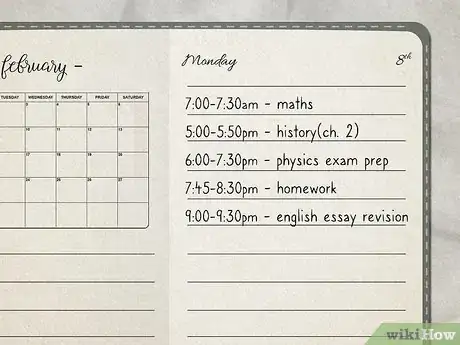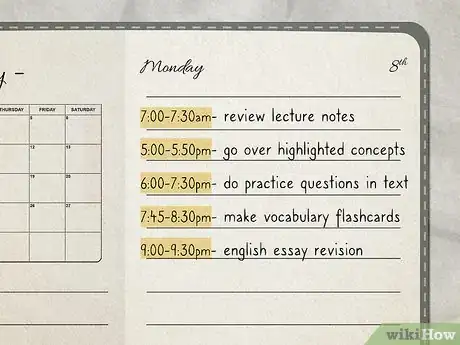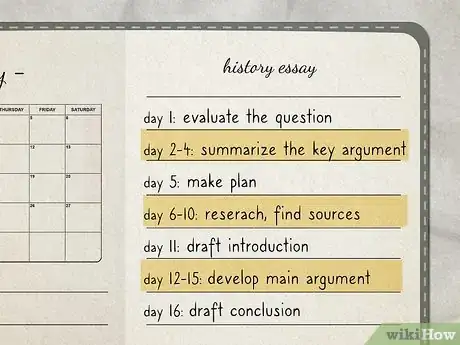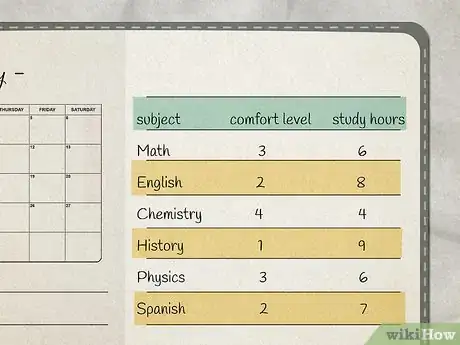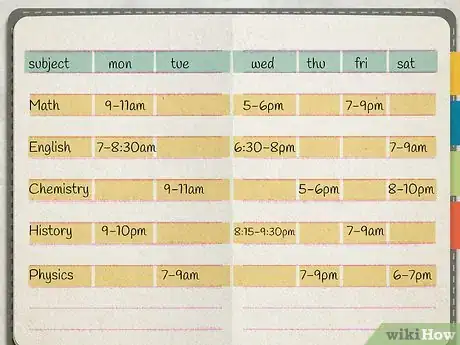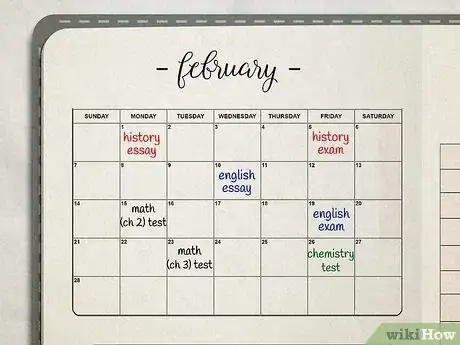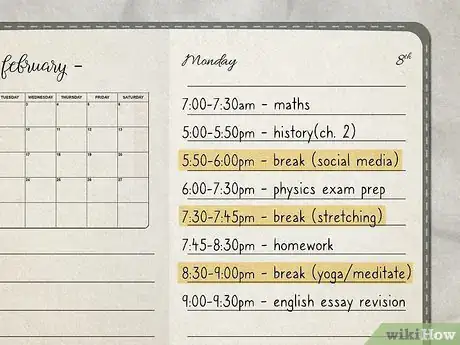This article was co-authored by Jai Flicker and by wikiHow staff writer, Amber Crain. Jai Flicker is an Academic Tutor and the CEO and Founder of Lifeworks Learning Center, a San Francisco Bay Area-based business focused on providing tutoring, parental support, test preparation, college essay writing help, and psychoeducational evaluations to help students transform their attitude toward learning. Jai has over 20 years of experience in the education management industry. He holds a BA in Philosophy from the University of California, San Diego.
There are 7 references cited in this article, which can be found at the bottom of the page.
wikiHow marks an article as reader-approved once it receives enough positive feedback. In this case, 82% of readers who voted found the article helpful, earning it our reader-approved status.
This article has been viewed 160,520 times.
Juggling multiple classes isn't easy. If you want to create a consistent plan for your studies so you're sure to get all of your assignments done on time, we can help you with that! Check out this handy list of tips and tricks to help you plan your studies and stay on track all semester long.
Steps
Expert Q&A
Did you know you can get expert answers for this article?
Unlock expert answers by supporting wikiHow
-
QuestionWhat is the best study routine?
 Jai FlickerJai Flicker is an Academic Tutor and the CEO and Founder of Lifeworks Learning Center, a San Francisco Bay Area-based business focused on providing tutoring, parental support, test preparation, college essay writing help, and psychoeducational evaluations to help students transform their attitude toward learning. Jai has over 20 years of experience in the education management industry. He holds a BA in Philosophy from the University of California, San Diego.
Jai FlickerJai Flicker is an Academic Tutor and the CEO and Founder of Lifeworks Learning Center, a San Francisco Bay Area-based business focused on providing tutoring, parental support, test preparation, college essay writing help, and psychoeducational evaluations to help students transform their attitude toward learning. Jai has over 20 years of experience in the education management industry. He holds a BA in Philosophy from the University of California, San Diego.
Academic Tutor Find the best learning approaches for you specifically. For example, a very common practice is creating flashcards. Some people love the idea of flashcards as a practical study tool. Others resist flashcards and may prefer typing out or rereading their notes. Use studying as a self-knowledge exercise to see what actually works and what doesn't. It's all a lesson in what works for you.
Find the best learning approaches for you specifically. For example, a very common practice is creating flashcards. Some people love the idea of flashcards as a practical study tool. Others resist flashcards and may prefer typing out or rereading their notes. Use studying as a self-knowledge exercise to see what actually works and what doesn't. It's all a lesson in what works for you. -
QuestionWhat is the best way to set a study schedule?
 Jai FlickerJai Flicker is an Academic Tutor and the CEO and Founder of Lifeworks Learning Center, a San Francisco Bay Area-based business focused on providing tutoring, parental support, test preparation, college essay writing help, and psychoeducational evaluations to help students transform their attitude toward learning. Jai has over 20 years of experience in the education management industry. He holds a BA in Philosophy from the University of California, San Diego.
Jai FlickerJai Flicker is an Academic Tutor and the CEO and Founder of Lifeworks Learning Center, a San Francisco Bay Area-based business focused on providing tutoring, parental support, test preparation, college essay writing help, and psychoeducational evaluations to help students transform their attitude toward learning. Jai has over 20 years of experience in the education management industry. He holds a BA in Philosophy from the University of California, San Diego.
Academic Tutor Try to find a schedule that works for you. Some people really need their sleep and may do better with a late start when studying. Others love getting up early, so they're going to do better with an early start to get all of their studying out of the way. Create a schedule that fits your temperament as an individual.
Try to find a schedule that works for you. Some people really need their sleep and may do better with a late start when studying. Others love getting up early, so they're going to do better with an early start to get all of their studying out of the way. Create a schedule that fits your temperament as an individual. -
QuestionHow do I keep my mind from wandering to my friends, mobile, and WhatsApp when I am trying to study?
 Community AnswerPut your phone far away from you, in another room. Or you could even give it to a friend or family member to monitor it to prevent you from checking it for messages.
Community AnswerPut your phone far away from you, in another room. Or you could even give it to a friend or family member to monitor it to prevent you from checking it for messages.
References
- ↑ https://learningcenter.unc.edu/tips-and-tools/studying-101-study-smarter-not-harder/
- ↑ https://lsc.cornell.edu/how-to-study/studying-for-and-taking-exams/guidelines-for-creating-a-study-schedule/
- ↑ https://learningcenter.unc.edu/tips-and-tools/studying-101-study-smarter-not-harder/
- ↑ https://firstyear.mit.edu/tutoring-support/study-tips/mastering-tests/draft-study-plan
- ↑ https://learningcenter.unc.edu/tips-and-tools/studying-101-study-smarter-not-harder/
- ↑ Jai Flicker. Academic Tutor. Expert Interview. 20 May 2020.
- ↑ https://firstyear.mit.edu/tutoring-support/study-tips/mastering-tests/draft-study-plan
- ↑ https://www.edutopia.org/article/5-research-backed-studying-techniques
- ↑ https://lsc.cornell.edu/how-to-study/studying-for-and-taking-exams/guidelines-for-creating-a-study-schedule/
- ↑ https://www.sciencenewsforstudents.org/article/top-10-tips-study-smarter-not-longer-study-skills
- ↑ https://www.sciencenewsforstudents.org/article/top-10-tips-study-smarter-not-longer-study-skills
- ↑ https://lsc.cornell.edu/how-to-study/studying-for-and-taking-exams/guidelines-for-creating-a-study-schedule/
- ↑ https://lsc.cornell.edu/how-to-study/studying-for-and-taking-exams/guidelines-for-creating-a-study-schedule/
- ↑ https://www.stetson.edu/administration/academic-success/media/STUDY%20SCHEDULE.pdf
- ↑ https://www.stetson.edu/administration/academic-success/media/STUDY%20SCHEDULE.pdf
- ↑ https://www.edutopia.org/article/5-research-backed-studying-techniques
- ↑ Jai Flicker. Academic Tutor. Expert Interview. 20 May 2020.
- ↑ Jai Flicker. Academic Tutor. Expert Interview. 20 May 2020.
About This Article
You can plan your studies by covering everything in your course and giving extra time to difficult sections. Figure out how much time you have to study each night and write a schedule for all the work you need to do. Include time for revising previous lessons, practicing sample questions, and learning anything new you need to know. Give extra time to parts of your course that you don’t understand as well and just refresh your knowledge on the parts you know well. Try to revise your syllabus in chronological order, starting with the first things you learned and working your way through the classes so you’ll remember it better. Don’t forget to schedule time for relaxing too, so you don’t overwork yourself. For more tips, including how to create a good study environment, read on!
